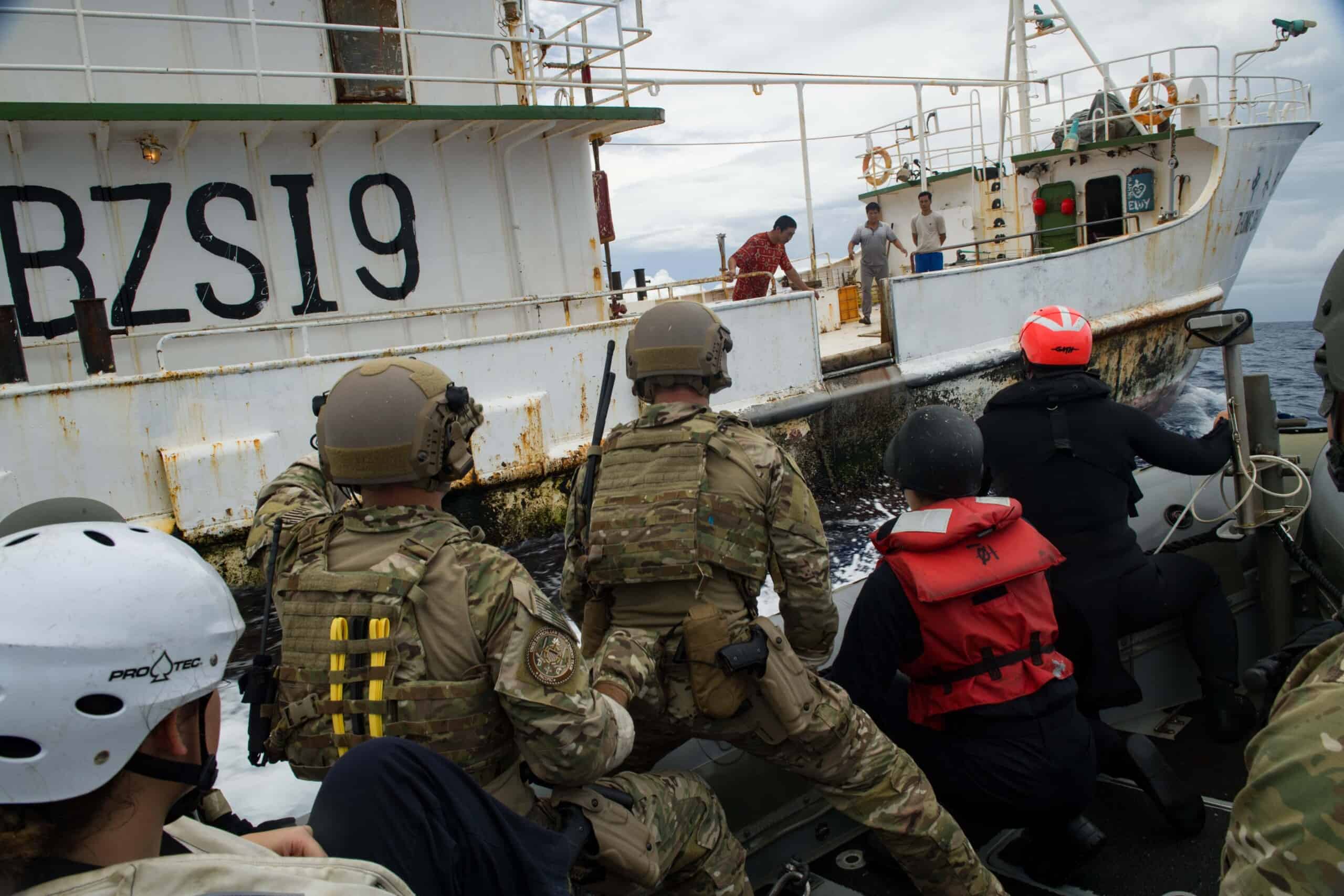
U.S. sanctions enforcers have a new sector in their sights: illegal fishing. Last week, the Treasury Department imposed some of its harshest financial sanctions on two large Chinese fishing companies and their top executives, in a major show of force by the Biden administration.
One of the sanctioned companies, Pingtan Marine Enterprise, is publicly listed on the Nasdaq stock market, making it the first time that Washington has imposed “Global Magnitsky” sanctions, which target the worst human rights offenders, on a U.S.-listed firm.
The move is also bringing fresh attention to Chinese fishing fleets and their involvement in illegal distant water fishing. Environmental groups and governments have long criticized this practice, which both depletes stocks of endangered fish and encroaches on the sovereign waters of foreign countries.
This week, The Wire looks at the fight against illicit seafood: China’s role in it, the companies involved, and why the U.S. is cracking down on the practice now.
IUU FISHING
Global demand for seafood has steadily risen over the past two decades, much of it driven by China’s economic rise. At the same time, fish stocks in China’s regional waters have been thoroughly depleted.
As a result, China’s fishing boats are venturing out ever further into international waters and other jurisdictions to extract their catch. Today, China has the largest distant water fishing fleet in the world, but much of the demand for its catch comes from outside its borders: up to 75 percent of China’s seafood imports may actually be re-exported, according to a recent study.
Chinese fishing boats are not always welcomed overseas, however. From Southeast Asia to South America and West Africa, local governments have decried China’s role in what the United Nations terms “illegal, unreported and unregulated” (IUU) fishing — fishing in contravention of local and international laws, encroaching on sovereign waters as well as conservation zones.
In 2020, for example, a fleet of nearly 300 Chinese fishing vessels was detected trawling the waters off the Galapagos Marine Reserve, a UNESCO World Heritage site, drawing international criticism.
| Company | Flagged Vessels | Country |
|---|---|---|
| Pingtan Marine Enterprise | 17 | China |
| China National Overseas Fisheries Corporation (CNFC) | 16 | China |
| Dalian Ruitaifeng Pelagic Fishery Co (formerly Dalian Lianrun) | 13 | China |
| Qingdao Rongchang Ocean Fishery Co. (subsidiary of Seacon Shipping Group) | 10 | China |
| Pescatun de Colombia SA | 10 | Colombia |
| Fuzhou Dongxinlong Ocean Fishing Co. | 8 | China |
| Rongcheng Rongyuan Fishery Co | 7 | China |
| Dalian Bo Yuan Ocean Fishing Co | 7 | China |
| Fujian Zhengguan Fishery Development Co | 6 | China |
| Albacora SA | 6 | Spain |
Source: Financial Transparency Coalition
The IUU fishing industry is notorious for its use of forced labor. Narrow margins and scant oversight on the open seas has led to the regular exploitation and abuse of laborers on fishing boats. In one example cited by the Treasury Department, a crew aboard a Chinese vessel was kept at sea for 13 months without a port visit, during which five workers died; three of their bodies were dumped overboard.
Fishing companies determined to hide their involvement in such activities means the industry is particularly guilty of opaque financial reporting. Many large companies hide their operations behind webs of shell companies registered in foreign jurisdictions. In Ghana, for example, where IUU fishing is rampant, Chinese companies often hide their involvement through joint ventures with local firms, whose names exclusively appear on local public records.
“For us, illicit fishing is part of a wider problem of illicit financial flows,” says Matti Kohonen, executive director of the Financial Transparency Coalition (FTC), a nonprofit that recently published a report on IUU fishing. It estimates that IUU fishing is worth up to $23.5 billion a year, making it the world’s third most lucrative natural resource crime, after illicit mining and timber.
The escalating competition for influence in the Indo-Pacific has made China’s role in IUU fishing a growing priority for the U.S. and its allies. In May, the Quad — a security partnership between the U.S., Japan, Australia and India — unveiled a new initiative to counter illegal fishing using satellites. Canada is also deepening cooperation with Japan and Korea to counter illegal fishing.
ONE COMPANY: PINGTAN MARINE ENTERPRISE
Fujian-based Pingtan Marine Enterprise has one of China’s largest distant water fishing fleets. It also ranks first in terms of the number of vessels flagged for illegal fishing. Last week, Treasury officials sanctioned Pingtan and its chairman and chief executive Zhuo Xinrong, freezing any U.S.-based assets held by Pingtan and its CEO. American investors will also have to offload any financial stake in Pingtan within 90 days.
China has responded to the sanctions saying it is a responsible fishing country, and has been cooperating with efforts to clamp down on illegal fishing.
Pingtan and its affiliates are well known among NGOs and anti-illegal fishing activist groups. In 2017, Sea Shepherd, a conservation group whose vessels pursue illegal fishing boats on the open seas, recorded footage showing a Pingtan affiliate company engaging in the illegal transshipment of sharks. The company has also been accused by local governments and NGOs of wrongdoing in Indonesia, East Timor and Ecuador, as well as human rights abuses, including the use of forced labor on its boats.

Even before the sanctions, Pingtan was struggling financially, largely thanks to rising fuel costs as its fleet travels ever farther distances. The company posted losses in 2020 and 2021 despite government subsidies it received more than tripling during the same period.
Through a network of subsidiaries and affiliates controlled by family members, Pingtan chairman Zhuo is indirectly tied to a vast portfolio of fishing companies. Ownership of Pingtan’s fishing boats is distributed across several companies, making it hard to gauge the true size of the fleet.
The complexity of Pingtan’s ownership structure will likely make it difficult to sanction. “Absolutely it’s going to be hard,” says FTC’s Kohonen. “If you just sanction the vessels, you tend not to have effective sanctions and fines. Only after getting the beneficial owner do you get effective sanctions.”

Eliot Chen is a Toronto-based staff writer at The Wire. Previously, he was a researcher at the Center for Strategic and International Studies’ Human Rights Initiative and MacroPolo. @eliotcxchen




